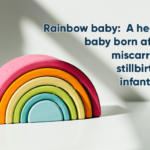This post was reviewed for medical accuracy by Rosalie Gunson, a Certified Registered Nurse Practitioner specializing in fertility care.
Implantation bleeding is one of the early pregnancy symptoms that I didn’t know existed until I started hanging out in fertility forums. Should you be worried if you don’t notice implantation bleeding? Does that mean you’re headed for another BFN?
Implantation bleeding can occur when a fertilized egg implants and some of the blood vessels in the uterine wall burst. It’s a harmless thing that doesn’t happen in all — or even most — pregnancies. So don’t worry, you can absolutely be pregnant without implantation bleeding!
What implantation bleeding is
All by itself, a fertilized egg isn’t a pregnancy. That fertilized egg needs to travel to the uterus and attach to the uterine wall (also called the endometrium), where it will hopefully develop into a healthy fetus.
If your uterine lining is too thin, the fertilized egg won’t be able to burrow in. That’s why most fertility doctors prefer to see a lining of at least 8mm before proceeding with an IVF transfer. For more info on what you can do to increase a thin lining, see this post.
Sometimes, but not always, implantation causes a small amount of bleeding. That’s because the uterine wall is full of blood vessels. Implantation bleeding happens when some of these little blood vessels burst.
For someone in the throes of the two-week wait (often called TWW or 2WW online), any type of bleeding can cause anxiety. Rest assured, implantation bleeding is normal — it doesn’t mean that your pregnancy is doomed! And not experiencing implantation bleeding is normal too.
It can be really hard not to obsess over early pregnancy symptoms, especially if you’ve invested your heart and soul in the quest to have a baby. I have a whole post about the pitfalls of symptom-spotting in the TWW here.
When you’d notice implantation bleeding
Implantation bleeding happens — IF it happens! –slightly after the new embryo implants. But when is that?
The average window for implantation depends on the method of conception:
- Non-IVF (intercourse or IUI): 6 to 12 days after ovulation
- IVF: 1-2 days after a fresh transfer, or about 5 days after a frozen transfer
Women with irregular cycles may not know their correct ovulation date . If the math is based on the wrong ovulation date, a light period could be mistaken for implantation bleeding.
If you did fertility treatment, though, you won’t have this problem. You should know exactly when you ovulated and when you did the IUI or the transfer.
Similarly, if you are pregnant from an IVF cycle, your estimated due date isn’t likely to be adjusted. For more info about IVF due dates, head over to Are Due Dates More Accurate With IVF?
Implantation bleeding vs. menstrual bleeding: What’s the difference?
A burrowing embryo only affects a small area of the uterine lining, but the entire lining is shed during your period. So it makes sense that that implantation bleeding would be like a shorter, lighter period.
Implantation bleeding is pretty subtle. You might only notice it when you wipe. You might need a pantyliner for a day or two, but you shouldn’t need a tampon.
The blood from implantation bleeding is also different from regular menstrual blood. It may be pink or brown rather than bright red, and you shouldn’t notice any clots.
Some, but not all, women who get implantation bleeding also notice cramping around the same time. Implantation cramps should be milder than menstrual cramps and again, they won’t last as long.
If you have a heavy red flow, clots, or persistent cramping, it’s probably not implantation bleeding. Most likely, it’s just your period arriving a little earlier than expected.
Many other causes of spotting before your period is due have nothing to do with pregnancy. Pelvic exams, uterine polyps or fibroids, endometriosis, and STDs are just a few examples.
Definitely see your doctor if you have any bleeding or abdominal pain that you can’t explain, or if your symptoms continue to get more intense.
What to do if you think you’re having implantation bleeding
Implantation bleeding is a sign that you should consider yourself Pregnant Until Proven Otherwise (PUPO). Keep taking your prenatal vitamins, make healthy decisions, and skip anything that isn’t safe in pregnancy. In other words, this is not the time for a girls’ weekend in Vegas! (That sentence was written pre-Covid. D’oh!)
You may wonder if implantation bleeding means it’s time to take a pregnancy test. The day you notice implantation bleeding is probably too early to get an accurate result — you could end up with a false negative. (Or, if you did a trigger shot, you could end up with a false positive. For more info on how trigger shots affect home pregnancy tests, see this post.)
To make sure you can trust the results, try to wait until your period is actually due to take a home pregnancy test. For useful tips, see the post Home Pregnancy Tests: Is it a BFN if the Second Line is Faint?
You can find recommendations for the best home pregnancy tests and other essentials for TTC on my Infertility Starter Pack page.
Another option is to ask your fertility clinic when you should come in for a blood pregnancy test (also called a beta). While a home test will just give you a yes or no answer, betas tell you how much hCG is in your system. In the early weeks of pregnancy hCG goes up pretty dramatically!
One thing you should NOT do if you notice spotting during a medicated fertility cycle is stop any progesterone you’re on. Sometimes women stop taking their progesterone because they mistake implantation bleeding for the start of their period. Fertility doctors typically want their patients to continue taking progesterone into the first trimester if they’re pregnant.
Bleeding in early pregnancy
I used to think that any bleeding during pregnancy had to be a bad sign. It turns out that bleeding in very early pregnancy is pretty common and not necessarily an indication that anything is wrong.
If you notice any kind of bleeding after you get your BFP, you should definitely tell your prenatal care providers. They are obviously the best people to determine whether it’s normal or not. But in general, some bleeding in the first trimester can be OK — especially if it’s not heavy or accompanied by pain.
Patients reporting bleeding, pain (especially pain on only one side), dizziness, or any other potentially concerning early pregnancy symptoms will probably be sent for an ultrasound. An ultrasound will confirm that the fetus is growing in the right place (not ectopic), has a heartbeat, and is an appropriate size for its gestational age.
Other causes of bleeding during pregnancy, such as a subchorionic hematoma, can be identified by ultrasound as well.
If you did infertility treatment you’re probably all too familiar with these types of ultrasounds, but if this will be a new experience for you, check out my post Do Transvaginal Ultrasounds Hurt?
Once you’re closer to the second trimester, you can finally say goodbye to transvaginal ultrasounds. By then, you should be able to do the over-the-belly ultrasounds that you’re used to seeing on TV.
Conclusion
It’s easy to get the impression from infertility forums that implantation bleeding happens to almost everyone. You might even start to worry if you don’t see any bleeding in the two-week wait.
Implantation bleeding is a harmless, normal thing that can happen when a fertilized egg burrows into the uterine wall. If you don’t notice it, you could definitely still be pregnant! You’ll just have to wait a few more days to find out. Good luck!

This post was last updated in February 2021.



 I’m Jenn! Here I am with my beautiful twin boys. My pregnancy was possible thanks to fertility treatment for PCOS.
I’m Jenn! Here I am with my beautiful twin boys. My pregnancy was possible thanks to fertility treatment for PCOS.


